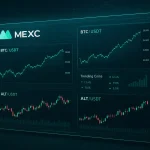Launching your own token is a powerful way to kick off a new blockchain project, create community engagement, or even build an innovative finance model for your business. As cryptocurrencies become increasingly mainstream, entrepreneurs and developers are eager to learn how to efficiently and securely launch their own tokens. This comprehensive guide will cover every major step you need to take, from idea to market listing, with expert strategies and tips to ensure long-term success.
Get exclusive trading rewards with Bitget! Sign up with code *cryptonew0 at Bitget and start your crypto journey.*
1. Understand Your Token’s Purpose
Before writing a single line of code, clarify what your token will do.
– Utility Tokens: Used for access, payment, or privileges within a platform (e.g., Uniswap’s UNI).
– Security Tokens: Represent shares or investments, regulated by securities law.
– Governance Tokens: Enable voting on protocol updates (e.g., MakerDAO’s MKR).
Ask yourself:
– What problem will the token solve?
– Who is the target audience?
– Will it have real-world or platform-specific utility?
2. Choose the Right Blockchain
Your choice of blockchain greatly impacts your token’s functionality and costs.
Popular Blockchains for Token Launch
- Ethereum (ERC-20 / ERC-721): The most popular, with broad ecosystem support.
- Binance Smart Chain (BEP-20): Lower fees, fast transactions.
- Solana, Polygon, Avalanche: Offer scalability and lower costs for specific use cases.
3. Define Tokenomics
Tokenomics is the blueprint of your token’s economy. Key components include:
– Total supply
– Distribution mechanism (Airdrop, ICO, private sale)
– Inflation/deflation dynamics
– Utility incentives (staking, governance)
– Vesting schedules for founders and early investors
Clearly document all aspects, as transparent and fair tokenomics attract more investors.
4. Develop the Token Smart Contract
For most projects, an ERC-20 contract (for Ethereum) suffices. If you lack development skills, hire an experienced blockchain developer or use reputable token creation tools. Remember to:
– Test comprehensively on testnets.
– Audit your contract (third-party audits are crucial to avoid exploits).
– Document your code.
Recommended Tools
5. Deploy and Verify the Contract
Once testing is complete:
– Deploy to mainnet from your secure wallet.
– Verify your smart contract on relevant explorers (e.g., Etherscan).
– Publish contract address and source code for trust.
6. Launch & Marketing Strategy
Launching a token is more than just deploying it:
– Build a pre-launch community (Telegram, Discord, Twitter).
– Announce on crypto forums (Bitcointalk, Reddit) and aggregators (CoinMarketCap).
– Prepare press releases and blog posts.
– Offer initial liquidity on decentralized exchanges (DEXs) like Uniswap or PancakeSwap.
7. Security and Compliance Considerations
Legal and cybersecurity precautions cannot be neglected. Consider:
– Regulatory compliance for securities, KYC/AML.
– Multi-signature wallets for funds management.
– Insurance against smart contract hacks.
8. Listing on Exchanges
After launch, aim to list your token on reputable exchanges. Start with decentralized options, then apply for centralized listings as your project matures. Use your growing community as proof of demand.
9. Continuous Development and Engagement
- Regularly update your community.
- Roll out roadmap milestones.
- Encourage governance participation if applicable.
- Establish feedback channels (AMAs, polls).
Ready to supercharge your token project with world-class trading tools? Register at Bitget using referral code: cryptonew0 for exclusive bonuses and benefits!
Whether you are building the next DeFi powerhouse or a simple fan token, following these smart strategies will help you avoid pitfalls and attract an engaged, loyal community.





